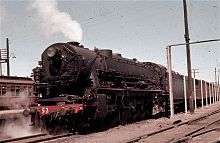New South Wales D57 class locomotive
| New South Wales D57 class | |||||||||||||||||||||||||||||||||||||||||
|---|---|---|---|---|---|---|---|---|---|---|---|---|---|---|---|---|---|---|---|---|---|---|---|---|---|---|---|---|---|---|---|---|---|---|---|---|---|---|---|---|---|
|
Class D57 Locomotive | |||||||||||||||||||||||||||||||||||||||||
| |||||||||||||||||||||||||||||||||||||||||
| |||||||||||||||||||||||||||||||||||||||||
| |||||||||||||||||||||||||||||||||||||||||
| |||||||||||||||||||||||||||||||||||||||||
The D57 class was a class of 4-8-2 steam locomotives built by Clyde Engineering for the New South Wales Government Railways in Australia. The tenders were built by Mort's Dock.
Introduction
The locomotives were among the heaviest of locomotives in Australia with a 23-long-ton (23.4 t; 25.8-short-ton) axle load and this along with their width restricted their sphere of operation to Thirroul on the Illawarra line, Wallerawang on the Main Western line and Junee on the Main South line.[1][2][3]
They were not permitted to operate on the Main Northern line due to load limitations on some bridges and a tighter loading gauge. They had the highest tractive effort of any conventional engines used in Australia and were of approximately equal capability to the 60 class Garratt locomotives. They were very reliable and had the nickname Lazy Lizzies because they made heavy workings seem effortless.[4] Another nickname was bestowed on the class, Chuckling Charlies due to their syncopated exhaust beat.[5]
The three cylinder design fitted to the class gave it a distinctive off-beat exhaust sound when climbing upgrade. This design was also fitted to the 58 class. However, a couple of features, such as the Gresley conjugating valve gear fitted to these locomotives has been the source of debate as to its efficiency.[6] A further 13 were built to a similar design in 1950 as the 58 class.
Demise and Preservation
The first was withdrawn in October 1957, the last in September 1961. The last example in traffic was saved for preservation by the New South Wales Rail Transport Museum. In June 1975, 5711 was hauled from Enfield to Thirlmere by 3801.[7] In September 2008 it was relocated to the Valley Heights Locomotive Depot Heritage Museum where it is being statically restored.[8]
| Preserved D57 Class Locomotives | ||||||||
|---|---|---|---|---|---|---|---|---|
| No. | Description | Manufacturer | Year | Current Organisation | Location | Status | Ref | |
| 5711 | 4-8-2 goods | Clyde Engineering | 1929 | NSW Rail Transport Museum | Valley Heights | static exhibit | [8] | |
Gallery
 5701 departing Clyde Engineering for a trial run to Penrith
5701 departing Clyde Engineering for a trial run to Penrith 5712 at Soldiers Bank near Mount Victoria
5712 at Soldiers Bank near Mount Victoria 5711 at Junee about to commence its final run on 23 September 1961
5711 at Junee about to commence its final run on 23 September 1961
See also
References
- ↑ "King's of the Road" Roundhouse October 1979 page 23
- ↑ Oberg, Leon (1984). Locomotives of Australia 1850's - 1980's. Frenchs Forest: Reed Books. p. 157. ISBN 0 730100 05 7.
- ↑ Grunbach, Alex (1989). A Compendium of New South Wales Steam Locomotives. Sydney: Australian Railway Historical Society, NSW Division. pp. 201–209. ISBN 0 909650 27 6.
- ↑ Oberg, Leon (February 1974). "The End of the 57-Class Locomotives". Australian Railway Historical Society Bulletin: 29–30.
- ↑ ±Locomotives, A Guide, written by Gifford Eardley
- ↑ Slee, David E (January 2000). "D57 and D58 Classes—Design Differences and Power Comparisons". Australian Railway Historical Society Bulletin: 3–19.
- ↑ "Museum on the Move" Roundhouse June 1976 page 16
- 1 2 Locomotive, Steam 5711 Department of Environment & Heritage
Further reading
- Belbin, Phil; Burke, David (1981), Full steam across the mountains, Sydney: Methuen Australia
External links
![]() Media related to New South Wales D57 class locomotive at Wikimedia Commons
Media related to New South Wales D57 class locomotive at Wikimedia Commons
